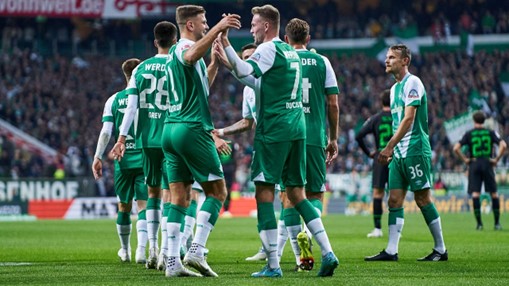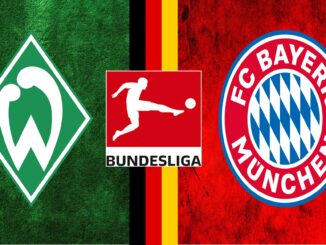
As a newly promoted side, the obvious objective in the first season back is to achieve survival and that is just what Werder Bremen did, but it really was a season of two halves for the Grün-Weißen and they will feel that they should have finished higher. Werder were the 11th best team in the Hinrunde, but the joint worst in the Rückrunde, where they finished level with Hertha Berlin.
The season began with two draw before Werder enjoyed a stunning win over Borussia Dortmund at the Signal Iduna Park to register their first three points in style. Seemingly heading for a defeat, an 89th minute equaliser from Lee Buchanan was followed by a 95th minute winner hit by Oliver Burke. Another thriller followed at home to Frankfurt on matchday four, but the Adler were the ones to triumph in the 4-3 at the Weser Stadion.
A third win, but a first at home came on matchday 8 in an impressive attacking display against Borussia Mönchengladbach. Ole Werner’s side with Marvin Ducksch and Niclas Füllkrug leading the line won 5-1 against the Foals. Schalke, Hertha and Hoffenheim were beaten before the Winterpause, but there were losses to Mainz, Freiburg, Bayern (6-1) and RB Leipzig.
Still, eleventh going into the World Cup break indicated a more than respectable start for the newcomers after their season in the 2.Bundesliga.Niclas Füllkrug’s ten goals had seen him lead the Bundesliga scoring charts and fired his way into Germany’s World Cup squad for Qatar.
In terms of bad starts to the Rückrunde, Werder’s couldn’t really have been worse. A 7-1 hammering at the hands of Köln gave the impression they were still in holiday mode and a subsequent loss to Union made it four defeats in a row either side of the break. They woke up with wins over Wolfsburg and Stuttgart, before successive defeats to Dortmund and Frankfurt. Bochum were beaten 3-0, but then the rot set in and Werder’s form and results sank without a trace.
The final twelve games of the season brought just one win (Hertha), but eight defeats and it was only the points accrued in the first half of the season that kept their head above the relegation zone and out of the scrap to survive. In the end they finished 13th, but were just three points ahead of Stuttgart who finished in the relegation play-off berth.
It was a case of ‘mission accomplished’ for Werder but coach Ole Werner will be very concerned about the falling away in the second half of the season where Werder were on a par with bottom side Hertha and had to rely on the good start they made to the season to survive. Rather surprisingly the Weser Stadion was not the fortress Werder wanted it to be and they were the league’s worst team at home with just 17 points acquired at home.
Survival will be the objective again next season, but more consistency over the whole campaign will be sought.
Highlight(s)
The amazing finish to the match in Dortmund was a season highlight very early on in the season. To equalise was impressive enough, but Oliver Burke’s winner was simply breath-taking and stunned to Signal Iduna Park into silence. The 5-1 win over Borussia Mönchengladbach was also a high with the interplay between Füllkrug and Ducksch proving too much for their opponents.
Seeing Niclas Füllkrug playing and scoring for Germany at the World Cup was a highlight as was his winning of the Torschuztenkanone as the league’s (joint) top-scorer.
Lowlight(s)
The customary thrashing at the Allianz Arena came on matchday 14 with a 6-1 defeat. Losing on penalties in the second round of the DFB Pokal to second tier Paderborn wasn’t their finest moment either.
The lowest point has to be the 7-1 annihilation at the Rhein-Energie Stadion in the first game back after the Winterpause. You expect it against Bayern, but for Köln to smash seven goals showed there were serious issues.
The lack of cheer at home in general was a lowlight with the Weser Stadion faithful only witnessing five victories all season. Lots of Werder’s defeats were close run affairs and it was more a death by a thousand cuts than a major killer blow.
Tale of the Tape
Record: 10-6-18, 36 points (1.06 per game), 13th in Bundesliga
Home Record: 17 points (5-2-10) Away Record: 19 points (5-4-8)
Goals: 51 (1.50 per game), Goals Against: 64 (1.88 per game), Diff: -13
xG: 41.1, xGA: 52.9, Diff: 11.8
Attack
Werder’s attack this season was all about the twin strike force that served them so well in the 2.Bundesliga harmonising perfectly in the top flight. Niclas Füllkrug had his best scoring season and finished as the league’s joint-top scorer with 16 goals. Injury towards the end of the season prevented him from adding to his tally and winning the award outright,
Marvin Ducksch had top scored in the second tier and took a while to break his drought at the start of the season. It took him until matchday 8 to notch his first but a season’s haul of 12 goals and 8 assists is a respectable tally. Ducksch was an ever-present while Füllkrug missed just six games meaning that Ole Werner was able to call upon his first-choice strike duo for the majority of the season.
Surprisingly, only Augsburg had fewer shot than Werder across the entire league (363), but Bremen’s shots on target percentage put them fifth overall (37.5%). They scored 51 goals from an xG of just 41.1 so outperformed their projected total by ten goals.
Defence
Ole Werner favoured a back three with Werder lining up in either a 3-5-2 formation or a 3-1-4-2 line-up. Marco Friedl was the one to marshal the back line with Amos Pieper, Milos Veljkovic and Niklas Stark combining to make the back three. Mitchell Weiser and Anthony Jung were the predominant wing backs in the system.
Werder conceded 64 goals from an xGA of 52.9 so there were obviously some issues with leakiness, but Werder’s attitude was they had the goals in the attack to make up for any losses at the back. This proved a falsehood in the second half of the season when too many games were lost in close run affairs due to poor defending.
Midfield
Werder led the league for tackles made in the midfield third (273) showing that they were a busy team in the middle of the pitch. Ole Werner used various combinations in the midfield, but the mainstays being Christian Groß, Leonardo Bittencourt, Jens Stage with Ilia Gruev, Romano Schmid and Niklas Schmidt also playing their part. Oliver Burke departed back to England due to a lack of game time, while winter arrival Maximilian Philipp made just three starts.
Creativity was not a strength with Werder the second worst side in the league for shot creating actions.
Transfer Review
Werder came up as runners-up to Schalke in the 2.Bundesliga, but went into the new season with a better squad and with just €4 million spent. The wheeling and dealing from Frank Baumann had to be performed under strict financial conditions and it must be said an excellent job was done.
The only transfer fee paid was that of €4 million to FC Copenhagen for midfielder Jens Stage. Mitchell Weiser was persuaded to sign a permanent deal after a loan from Bayer Leverkusen, while both Amos Pieper and Niklas Starke arrived on frees to strengthen the back line. Oliver Burke and Lee Buchanan arrived on loan deals from Sheffield United and Derby to add options to Ole Werner’s squad.
Pieper became a mainstay of the defensive unit, while Weiser’s Bundesliga experience made him a major asset. Jens Stage performed well and looks set to build upon this season next year. The winter window saw arrival of Maximilian Philipp on loan from Wolfsburg, but he made just three starts.
Player of the Season
Marvin Ducksch may have outscored him in the 2.Bundesliga promotion season, but this season saw Niclas Füllkrug take centre stage in the attacking line and become the first Werder player since Miroslav Klose in 2006 to win the Bundesliga Torjägerkanone for the league’s top scorer (joint with Leipzig’s Christopher Nkunku).
Lücke forced his way into the German national squad for the World Cup and scored twice in Qatar and is now a first-choice in Hansi Flick’s squad with six goals in six appearances for the Nationalmannschaft. Honourable mentions also must go to both Mitchell Weiser and Marco Friedl for their performances.
Newcomer
Ole Werner largely kept faith with the experience that saw Werder promoted , but 18-year-old Italian Fabio Chiarodia did force his way into the first-team squad and made three appearances. After two very brief substitute appearances the defender made his full debut away at Mönchengladbach and performed admirably in the back three alongside Niklas Stark and Amos Pieper with injuries hitting the Werder squad. One to watch for the future definitely.
Grade: C
A promising Hinrunde saw Werder finish 11th, but in the second half of the season they were the joint-worst team matching the level of bottom placed Hertha Berlin. In the end the points picked up in the opening phase of the season was the key and they survived unlike fellow promoted side Schalke.
It could have been worse, but the nagging feeling is there that more was in the season for Werder. They will want to focus on the Hinrunde rather than the rather disappointing Rückrunde and look forward to a second season back in the Bundesliga. Hanging on to their key players is now going to be the main focus.



